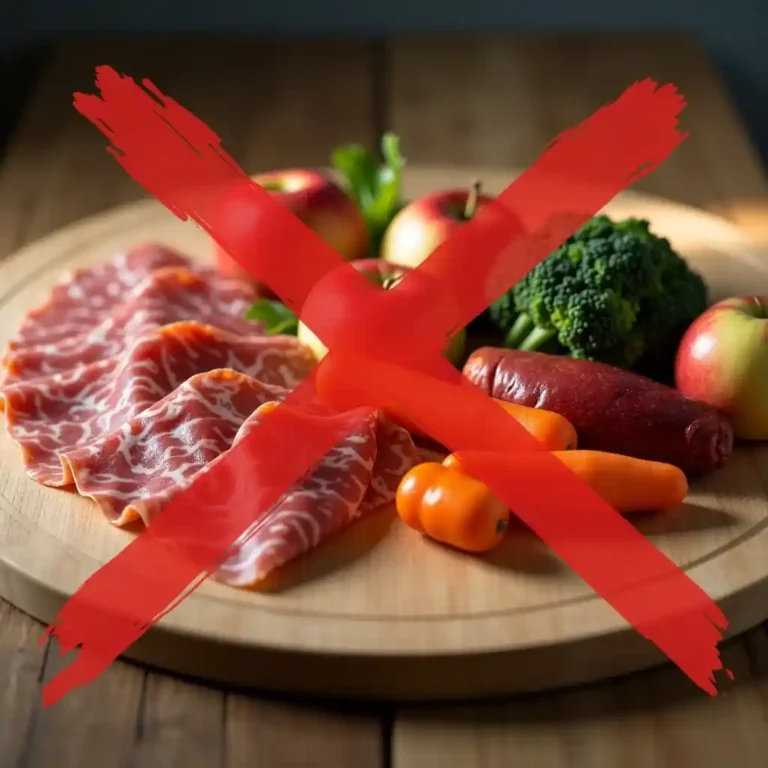Last Updated on October 11, 2025 by Sophy
Carnivore diet weight loss. Those three words flipped my entire approach to eating — and, honestly, to living.
Hey, I’m Sophy — the voice and cook behind MishMash Recipes. If you’ve followed me for a while, you know I’m not into quick fixes or flashy diet gimmicks. But there’s one shift I made that truly changed how I felt about food, energy, and my body’s ability to reset.
A few years ago, my meals were carb-heavy and energy-draining. Like many of you, I was desperate for something simple, something that worked. That’s when I stumbled upon the carnivore diet for weight loss. At first, it sounded extreme — an eating plan centered on meat, fish, and animal-based foods only. But what started as an experiment soon became the most effective reset I’d ever tried.
I didn’t invent the carnivore diet weight loss approach. I discovered it, tested it, and reshaped it into something I could actually live with — even if only for a season.
This guide is everything I wish I had when I first typed “how much weight can I lose on the carnivore diet” into Google. No fluff. No fads. Just a clear, honest look at how the carnivore diet helps with weight loss, what results you can expect, and whether it’s the right path for you.
Join Our Newsletter for More Healthy Cooking Tips
JUMP TO
Don’t Miss Our Costa Rican Tea Recipe for Weight Loss

Introduction to the Carnivore Diet Weight Loss
What is the Carnivore Diet?
The carnivore diet, a highly debated eating plan, is considered one of the most straightforward for weight loss. It’s based almost entirely on animal foods: beef, chicken, fish, eggs, and sometimes dairy. By cutting out plants, grains, and sugars, this diet forces the body to rely on protein and fat for energy.
For many, that shift is exactly what makes carnivore diet weight loss possible. With no carbs to fuel the body, fat takes center stage.
Why is it Becoming Popular for Weight Loss?
The surge in popularity comes down to two things: speed and simplicity. Unlike other plans, the carnivore diet for weight loss doesn’t require calorie tracking, macros, or endless meal prep. It strips food choices down to basics, and that minimalism delivers quick results.
By eliminating carbs, the body enters fat-burning mode, while protein and fat keep hunger at bay. Together, these effects create a powerful weight loss environment without the frustration of counting every bite.
Quick Overview of Benefits vs. Risks
On the plus side, carnivore diet weight loss benefits include:
- Rapid fat loss.
- Reduced cravings.
- More stable energy.
- Simpler eating routines.
On the flip side, risks include nutrient deficiencies, possible heart health concerns, and difficulty sustaining the diet long-term. For some, it works beautifully as a short-term tool — but not necessarily as a forever plan.
How the Carnivore Diet Promotes Weight Loss
The Role of Ketosis in Fat Burning
One major reason for weight loss on the carnivore diet is ketosis. With carbs out of the picture, the body burns fat for fuel. This shift can happen quickly and effectively because the diet is nearly zero-carb, making fat the body’s primary energy source.
Ketosis, when combined with a carnivore diet, may provide a significant advantage for those looking to lose stubborn weight.
Appetite Suppression and Reduced Calorie Intake
Another big advantage? You’re just not as hungry. Protein and fat keep you full longer, which naturally reduces calorie intake. This appetite control is why carnivore diet weight loss results often happen without deliberate calorie counting.
Instead of battling cravings, you feel satisfied after simple meals. That makes losing weight less about restriction and more about balance.
Cutting Out Processed Carbs and Sugar
Every diet struggles with one enemy: junk food. Processed carbs, sugary snacks, and empty calories derail even the strongest willpower. With carnivore eating, those foods are simply gone.
This “clean slate” effect is why carnivore diet weight loss transformations often look dramatic in the first few weeks. Cutting out sugar and refined carbs helps your body stabilize, which reduces cravings and leads to more consistent fat burning.
Expected Weight Loss on the Carnivore Diet
How Much Weight Can You Lose in a Month?
One of the most common questions is: how much weight can I lose in a month on the carnivore diet? While results vary, many people report losing anywhere from 5 to 15 pounds in the first four weeks. This happens because the body sheds water weight from carb elimination, followed by steady fat burning.
However, it’s important to understand that carnivore diet weight loss results aren’t the same for everyone. Certain people experience fast-paced development, while for others, growth is slower yet more constant.
Factors Influencing Weight Loss Speed
Several factors influence how quickly weight comes off:
- Starting weight – People with more body fat often lose weight faster initially.
- Activity level – Exercise speeds up fat burning and muscle preservation.
- Metabolism – Age, genetics, and hormones play a role in how efficiently you burn calories.
- Consistency – Sticking to carnivore eating without “cheat meals” maximizes results.
For example, someone who exercises regularly while following a strict carnivore plan may see faster results than someone who’s sedentary.
Realistic Results vs. Exaggerated Claims
Some success stories claim carnivore diet weight loss transformations of 30 or more pounds in just a few weeks. While that can happen, it’s not typical. Most of those early pounds come from water weight, not fat.
A more realistic expectation is steady fat loss of 1–3 pounds per week after the initial adjustment period. And keep in mind, dramatic short-term drops don’t always equal long-term sustainability.
The key is to treat this diet as a tool — not a miracle. By managing expectations, you’ll be more motivated to stay consistent and avoid burnout.
Benefits of the Carnivore Diet Beyond Weight Loss
Stable Blood Sugar and Insulin Sensitivity
One benefit that surprises many people is improved blood sugar stability. Because the carnivore diet eliminates carbs, blood sugar spikes and crashes become rare. For some, especially those with insulin resistance or type 2 diabetes, this can feel life-changing. Consistent energy levels can lead to less intense cravings, more stable moods, and better management of your appetite.
Mental Clarity and Energy Levels
Another unexpected perk? Clearer thinking. Many followers of the carnivore diet weight loss plan report sharper focus and steady mental energy throughout the day. Without sugar crashes or carb overloads, your brain can run more smoothly on fat and ketones.
The enhanced mental clarity from a carnivore diet is a factor that often encourages people to continue it for a longer duration than they had originally intended. It’s not just about shrinking the waistline it’s about how your mind feels too.
Simplified Eating Approach
If you’ve ever felt stressed about meal planning, the carnivore lifestyle might feel refreshingly simple. There’s no need to measure, weigh, or track every bite. You consume meat, fish, eggs, and sometimes dairy. That’s it.
For busy people, this simplicity makes the diet much easier to follow than plans that involve complicated recipes. And when the eating process is less stressful, the chances of sticking with it — at least short-term — increase dramatically.
Risks and Drawbacks of the Carnivore Diet
Restrictiveness and Sustainability Challenges
While carnivore diet weight loss can be impressive, one of its biggest downsides is sustainability. Cutting out entire food groups makes the diet extremely restrictive. Eating only meat and animal products can feel monotonous over time, and social situations like family dinners or dining out often become stressful.
This is why many people use the carnivore diet for weight loss as a short-term tool instead of a permanent lifestyle. The rigid nature of the plan makes it hard to maintain long-term without falling off track.
Nutrient Deficiencies
Another concern is nutrition. By eliminating fruits, vegetables, nuts, and seeds, you miss out on essential vitamins, minerals, antioxidants, and especially fiber. Over time, these gaps can lead to digestive issues, vitamin deficiencies, and a weakened immune system.
For example, fiber plays a critical role in gut health, and without it, some followers of the carnivore plan report constipation or discomfort. These side effects are an important reminder that while carnivore diet weight loss may look great on the scale, it comes with trade-offs.
Heart Health and Cholesterol Concerns
The carnivore diet is inherently rich in saturated fats and cholesterol, which can be a concern for people with pre-existing heart conditions. While some followers report positive changes in their blood markers, others experience an increase in cholesterol levels, which could pose a risk to their cardiovascular health.
If you have a family history of heart disease, you should talk to a healthcare provider before starting this plan.
Short-Term Side Effects: The “Keto Flu”
During the first week or two, many people experience symptoms like fatigue, headaches, irritability, or brain fog. The ‘keto flu’ is a common term for the symptoms that occur as your body shifts from using carbohydrates to using fat for energy.
While these side effects usually pass, they can make the adjustment period challenging. If you’re not prepared, it’s easy to quit before the benefits of carnivore diet weight loss even begin.
How to Safely Start the Carnivore Diet Weight Loss
Choosing the Right Animal-Based Foods
For success with the carnivore diet for weight loss, the key is to choose the right foods. Not all animal products are created equal. Lean meats like chicken breast may help cut calories, but fattier cuts like ribeye can keep you satisfied longer. When it comes to a healthy diet, it’s often a good idea to include a mix of red meat, fish high in omega-3s, and organ meats that are packed with nutrients. Including variety within animal foods prevents boredom and gives your body more essential nutrients. For example, liver provides vitamin A and iron, while salmon delivers omega-3s that support heart health.
Hydration, Electrolytes, and Avoiding Keto Flu
One mistake beginners make is ignoring hydration. When carbs are removed, the body flushes water and electrolytes quickly. This can cause headaches, fatigue, or muscle cramps.
To prevent this, drink plenty of water and consider adding electrolytes like sodium, magnesium, and potassium. A simple step like salting your food generously can make a big difference in how smoothly you transition into the carnivore diet for weight loss.
Transition Tips for Beginners
If the idea of going “all in” feels overwhelming, start gradually. You could begin with a low-carb approach (like keto) and then transition into carnivore once your body adapts.
Other helpful strategies include:
- Meal prepping so you always have meat ready.
- Stocking up on affordable cuts like ground beef.
- Keeping snacks like hard-boiled eggs or jerky for on-the-go.
By easing into the plan, you’ll reduce the shock to your system and increase your chances of sticking with it long enough to see carnivore diet weight loss results.

Carnivore Diet Meal Plans and Food List
Example 7-Day Carnivore Meal Plan
One of the biggest hurdles in starting the carnivore diet for weight loss is knowing what to eat. To make things easier, here’s a simple 7-day meal plan designed to keep you satisfied while maximizing fat-burning.
| Day | Breakfast | Lunch | Dinner | Snacks (Optional) |
|---|---|---|---|---|
| 1 | Scrambled eggs with butter | Grilled ribeye steak | Baked salmon | Beef jerky |
| 2 | Omelet with cheddar cheese | Chicken thighs (skin-on) | dessert | Hard-boiled eggs |
| 3 | Bacon and eggs | Ground beef patties | Lamb chops | Sardines |
| 4 | Egg muffins with sausage | Roast chicken wings | Salmon fillet | chicken ice cream |
| 5 | Fried eggs in tallow | Turkey burgers | Ribeye steak | Bone broth |
| 6 | Cheese omelet | Beef liver sautéed in butter | Grilled salmon | String cheese |
| 7 | Boiled eggs with bacon | Pork belly | Roast duck | Smoked salmon |
This plan shows how carnivore diet weight loss meals don’t have to be boring. With variety in meats, fish, and dairy, you can keep things exciting while staying on track.
Best Meats, Fish, and Animal Products for Weight Loss
Not all animal foods are equal when it comes to maximizing fat loss. Some of the best options for the carnivore diet weight loss approach include:
- Beef – Ribeye, ground beef, sirloin, and liver.
- Poultry – Chicken thighs, wings, turkey burgers.
- Fish – Salmon, sardines, mackerel, trout.
- Eggs – A staple for breakfast and snacks.
- Dairy (optional) – Cheese, butter, heavy cream.
Foods to Avoid on the Carnivore Diet
To successfully lose weight on the carnivore diet, you must eliminate:
- All fruits and vegetables.
- Grains and legumes.
- Processed foods and sugars.
- Plant oils (like canola or soybean oil).
By focusing only on nutrient-rich animal foods, you create the conditions for steady fat burning without distractions from carb cravings.
How Long Should You Follow the Carnivore Diet Weight Loss?
Short-Term vs. Long-Term Strategy
The truth is, the carnivore diet weight loss journey isn’t meant for everyone long-term. While some people stay on it for months or even years, most find it more realistic as a short-term fat-loss strategy.
For beginners, a 30- to 60-day period is often recommended to jumpstart results. This timeframe allows you to see noticeable fat loss, improved energy, and better mental clarity without long-term nutrient concerns.
When to Transition Off the Carnivore Diet
At some point, most people transition out of strict carnivore eating and reintroduce certain foods. This could include low-carb vegetables, nuts, or berries. The goal is to build a sustainable eating plan that maintains the carnivore diet weight loss results you worked hard for.
Think of carnivore as a reset button — it simplifies eating, burns fat fast, and gives your metabolism a boost. But the ultimate goal is a balanced, sustainable lifestyle.
Safer Alternatives for Sustainable Results
If you’re worried about nutrient gaps or sustainability, you might consider other options like:
- Ketogenic diet – Low-carb but includes vegetables and some fruits.
- Paleo diet – Focuses on whole, unprocessed foods with more variety.
- Low-carb Mediterranean – Combines the benefits of high-protein eating with heart-healthy fats.
These alternatives can help you maintain the progress from carnivore diet weight loss while offering more flexibility and nutrients for the long haul.
FAQs on Carnivore Diet Weight Loss
How much weight can I lose in a month on a carnivore diet?
Most people can expect to lose between 5–15 pounds in the first month. The initial drop often comes from water weight as your body adjusts to low carbs, followed by steady fat loss. The exact amount depends on your starting weight, activity level, and how strictly you follow the carnivore diet weight loss plan.
Do you lose weight fast on a carnivore diet?
Yes, many people experience fast results in the early weeks. By cutting carbs completely, your body burns fat for fuel, leading to quicker weight loss compared to traditional diets. The appetite suppression effect of protein and fat also means you naturally eat less, which speeds up carnivore diet weight loss results.
Why am I losing so much weight on the carnivore diet?
This is due to a reduction in carbohydrate intake, which leads to fewer cravings and an increase in fat burning. When you eat only animal products, your body enters ketosis and starts using stored fat for energy. The elimination of processed foods and sugars also reduces bloating, making carnivore diet weight loss transformations look dramatic.
How long should I do the carnivore diet for weight loss?
For most people, the carnivore diet weight loss journey works best as a short-term reset. For most people, a 30- to 60-day timeframe is sufficient to achieve desired outcomes without causing long-term nutritional problems. After that, you may want to transition into a more balanced plan that maintains fat loss while supporting overall health.
Can You Maintain Weight Loss After the Carnivore Diet?
After finishing the carnivore diet, many people maintain part of their weight loss by slowly reintroducing low-carb vegetables and whole foods. The key is to avoid returning to processed carbs and sugar. If you transition gradually, your metabolism stays stable, and most of your fat loss can be maintained long-term.
Conclusion: Is the Carnivore Diet the Key to Lasting Weight Loss?
Summary of Weight Loss Potential
The carnivore diet weight loss plan can deliver rapid and noticeable results, especially in the first month. By eliminating carbs, suppressing appetite, and simplifying food choices, many people shed pounds faster than they expected.
Key Takeaway: Short-Term Tool, Not a Forever Plan
That said, the carnivore approach comes with challenges. Restrictive eating, nutrient gaps, and potential heart health concerns mean it’s not ideal for everyone as a long-term lifestyle. Think of it as a powerful tool to jumpstart fat loss rather than a permanent fix.
Final Advice: Consult a Healthcare Professional
Before starting any extreme diet, including the carnivore diet for weight loss, talk to your doctor. What works wonders for one person may pose risks for another. With the right planning and medical guidance, this diet can help you achieve a reset, drop pounds, and discover a simpler way of eating — at least for a season.






1 thought on “Carnivore Diet Weight Loss”